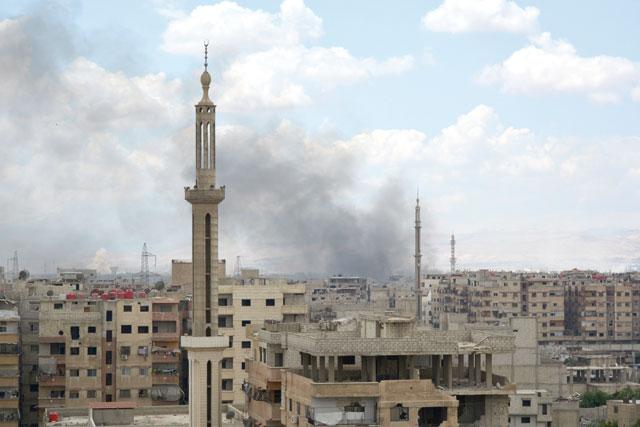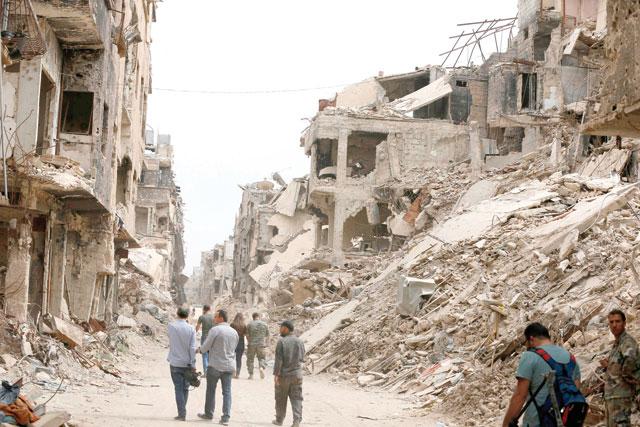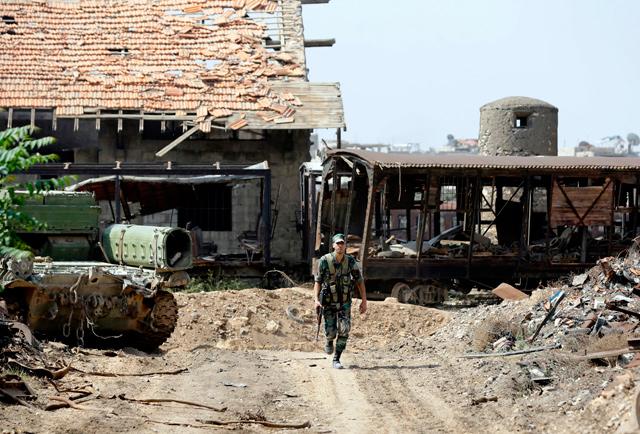You are here
Syrian army pounds Palestinian camp; UN warns of dire conditions
By Reuters - Apr 27,2018 - Last updated at Apr 27,2018
AMMAN, Jordan — The Syrian army on Thursday intensified its bombardment of a besieged camp for Palestinian refugees and nearby rebel-held areas in southern Damascus, the last area near the capital outside government control.
Most civilians have long fled the Yarmouk camp, once the largest in Syria for Palestinian refugees, but enough have stayed behind that the United Nations has called on the warring parties to spare civilians.
The Russian-backed Syrian army launched a major offensive last week to capture the south Damascus enclave that includes Yarmouk and neighbouring areas, which have been held for years by rebel fighters and Daesh militants.
The Yarmouk campaign is part of a wider offensive to recapture remaining rebel areas that has shown no sign of letting up since Western countries launched air strikes on April 14 to punish the government for a suspected poison gas attack.
President Bashar Assad’s is now in by far his strongest position since the early months of the seven-year civil war.
Pierre Krähenbühl, commissioner of the United Nations Works and Relief Agency which runs camps for Palestinian refugees, warned of the “catastrophic consequences of the escalation” in the camp, which had “endured indescribable pain and suffering over years of conflict”.
State media showed footage of a ground assault led by tanks on the fringes of Hajar Al Aswad, which adjoins the sprawling Yarmouk camp. Aerial strikes and bombardment have relentlessly pounded residential areas for days.
The army said it had made advances and killed dozens of militants. Rebels in the area say however that there has been no significant push inside Hajar Al Aswad or the camp, despite hundreds of strikes.
At least 19 civilians have been killed and 150 injured since the campaign began, mostly women and elderly, according to Ayman Abu Hashem, a lawyer and former camp resident in touch with residents who have stayed. The sprawling camp was part of a densely populated, impoverished squatter belt only few kilometres away from the heart of the capital.
Two sources inside the camp said around 1,500 families remain there.
Christopher Gunness, an UNRWA spokesman, said the plight of remaining civilians had worsened: “Many are sleeping in the streets, begging for medicine. There is almost no water or electricity. Their suffering is unimaginable.”
The camp has been under siege by the army since rebels captured it in 2012. Most civilians fled when Daesh militants drove out comparatively secular rebels in 2015, but thousands remained behind, many of whom have fled this week.
At least 3,500 Palestinian refugees from the camp have in the last week taken shelter in the nearby town of Yalda, according to UNRWA and a resident who confirmed the figure.
Yalda is not controlled by Daesh fighters but by rebels who have long abandoned fighting under de facto ceasefire deals with the army. The government aims to push them to leave the area for northern Syria under an evacuation deal.
Related Articles
BEIRUT, Lebanon — The Syrian army bombarded a militant enclave in south Damascus on Monday, state television and a war monitor said, as Pres
BEIRUT/DAMASCUS — The UN on Tuesday said it was almost impossible to imagine people returning to Syria's ruined Yarmouk Palestinian camp, a
AMMAN — Syrian troops on Sunday tightened the noose around a major Palestinian refugee camp held by Daesh militants in southern Damascus whe


















